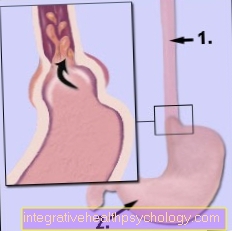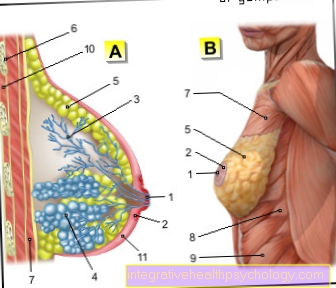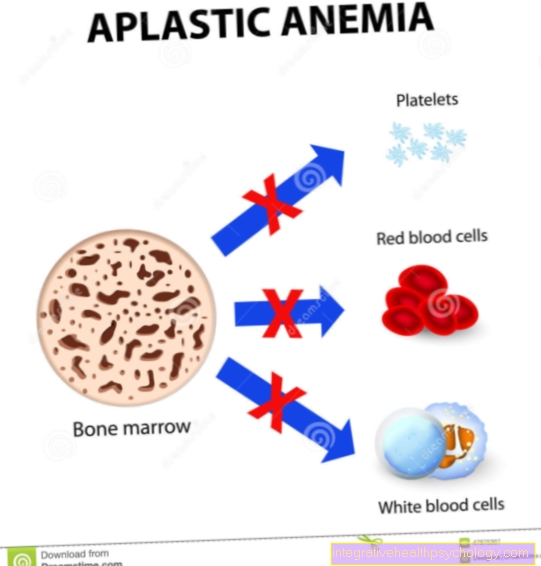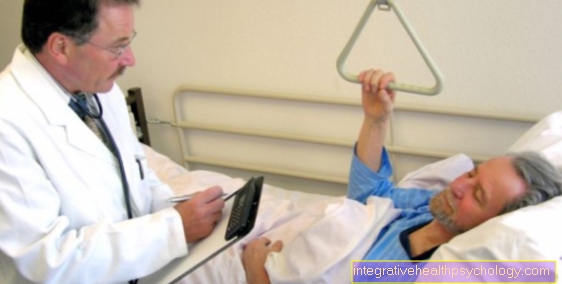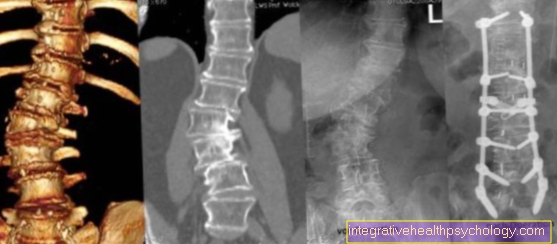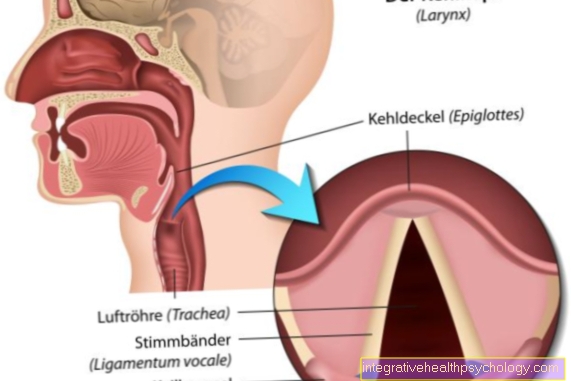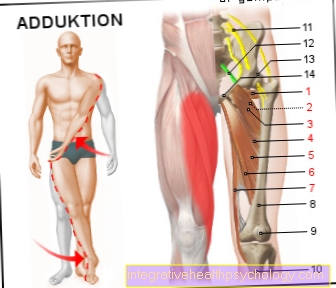Heartburn symptoms
introduction
The term heartburn comes from the Old High German "Sod", which means something like boiling.
Heartburn is not a disease in itself; it is rather an expression of another disease, usually a disorder of the esophagus.
Heartburn can rarely occur when all organs are perfectly healthy.

Heartburn is typical in reflux disease (it is the key symptom of so-called reflux esophagitis), in which acidic stomach contents flow back into the esophagus and occasionally into the mouth.
Since the stomach acid is very acidic and thus extremely irritating the mucous membrane of the esophagus, the pain in the esophagus typical of heartburn occurs.
Since this is located behind the breastbone, the pain is traditionally felt here, but sometimes it can also radiate into the immediate vicinity, especially in the throat and mouth area. The pain may also be felt more than burning or pressing.
In addition, heartburn is often diet-dependent. This means either that symptoms can always show up after eating or only after a person has consumed certain foods or a large amount of food.
However, in some patients the symptoms are particularly evident during sleep. Adequate diet can also help relieve some of these symptoms.
Read more about this under: "Diet for heartburn"
Other problems that are often noticed at the same time as heartburn are swallowing disorders, bloating, nausea that can even lead to vomiting, hoarseness (especially early in the morning), chronic cough or inflammation of the gums. These symptoms can be caused by the fact that the stomach acid is unnaturally in places other than the stomach and causes irritation there.
The intensity and frequency of heartburn symptoms vary from person to person. However, if you notice the above symptoms more often, it makes sense to see a doctor in order to be able to determine any underlying illness and treat it appropriately.
Can heartburn also indicate heart disease?
Heartburn is most often perceived as a burning pain behind the sternum. Pain in the entire chest area can always indicate a heart problem and should therefore not be underestimated.
If in doubt, a heart condition should be ruled out as this could have serious consequences. Chest pain can be a sign of coronary artery disease (calcification of the coronary arteries) or a heart attack.
It is not uncommon for these symptoms to be misinterpreted as a heart condition. In contrast to the symptoms caused by the heart, however, heartburn often still comes with accompanying symptoms. Above all, this includes the increased, often either bitter or sour belching.
Burning in the chest / behind the sternum with heartburn
A burning sensation in the chest or behind the breastbone is the most common symptom of reflux (backflow of stomach acid). Overproduction of gastric acid and / or reduced tension in the sphincter between the esophagus and stomach causes digestive juice to enter the esophagus.
There it attacks the unprotected mucous membrane and causes small injuries that can manifest as a burning sensation. Since the esophagus is located in the chest just behind the breastbone, the pain is usually felt in the chest area.
For more information, read on: Burning behind the breastbone.
Pain in the esophagus
With heartburn, the esophagus is particularly affected. In contrast to the gastric mucosa, the mucous membrane of the esophagus is not sufficiently protected against the corrosive acid, which results in the injuries described above. The injuries can also cause pain in the esophagus. In addition, they can become inflamed and lead to longer-lasting symptoms.
Read more on the subject at: Burning pain in the esophagus - that's behind it
Burning in the throat with heartburn
Heartburn occurs when stomach acid enters the esophagus from the stomach. This can happen, for example, if the sphincter muscle between the stomach and esophagus does not close sufficiently.
Depending on the severity, the irritating digestive juice can rise up into the throat. The mucous membrane of the entire esophagus is not sufficiently protected against the strongly irritating stomach acid and is therefore easily injured. The small lesions (injuries) can become infected and cause a burning sensation in the throat.
Read more on this topic at: Burning sensation in the esophagus and inflammation of the esophagus
Cough for heartburn
Cough is a protective reflex of the body that always comes into play when something unintentionally enters the windpipe. By coughing, the body tries to prevent the lungs from being damaged by the particles or fluids mistakenly entering it.
If stomach acid gets into the esophagus, it can rise up to the larynx and from there into the windpipe. In this case, the body's protective reflex kicks in and you have to cough.
This often happens with chronic reflux (reflux of stomach acid). This further irritates the windpipe, which also leads to a cough.
Heartburn complaints
- Esophagus (esophagus)
- stomach
The detail shows the leaky gastric entrance, which allows acidic porridge to flow back through the esophagus.
Hoarseness with heartburn
If stomach acid gets through the esophagus and the larynx into the windpipe, it doesn't just result in a cough. The digestive juice can also hit the vocal cords.
The surface of the vocal cords is not protected against the strong acid and carries away small lesions (injuries). These injuries can become infected, causing temporary hoarseness.
If a person suffers from chronic heartburn, stomach acid can also reach the vocal cords more frequently, permanently damaging them. It can lead to chronic inflammation of the vocal cords and thus to permanent hoarseness.
Belching with heartburn
In most cases, heartburn is caused by overproduction of stomach acid. As soon as some of the stomach acid gets into the esophagus, it is attacked. A thick protective layer of mucus is produced by special cells in the stomach, which protects all cells in the stomach wall from the particularly corrosive digestive juice. However, this protection is no longer fully effective if the stomach acid is too concentrated. This also irritates the stomach and leads to acid belching.
Sore throat with heartburn
If gastric juice gets up into the throat through reflux, the mucous membrane there is also irritated. This can also cause small injuries here that quickly become infected. Especially when you eat new food and drink, parts of it can settle on the small injuries.
Infection with bacteria or viruses is also possible, which can cause a stronger inflammatory reaction. Through these processes, the reflux not only leads to heartburn but also to a sore throat.
Nausea with heartburn
Heartburn is often a result of stomach problems. Due to the overproduction of gastric acid, it reaches the esophagus via the sphincter and damages the mucous membrane there. The increased gastric acid production is often the result of dysregulation in the stomach and is therefore associated with nausea and rarely with vomiting.
The faulty regulation can be triggered by various hormones or signals that are incorrectly transmitted from the brain to the stomach.
Read more on this topic at: Causes of heartburn
Heartburn with back pain
The esophagus is the affected organ in heartburn. Usually the symptoms are expressed as pain behind the breastbone. Since the esophagus lies between the breastbone and the spine, the pain can also radiate to the back. In such cases, the back muscles in the upper area often cramp up and the back pain increases due to persistent tension.
Esophageal cancer and heartburn
The most feared consequence of heartburn is esophageal cancer. Heartburn is caused by acid in the stomach that gets into the esophagus and injures it.
In chronic heartburn, the normal mucous membrane cells of the esophagus are gradually replaced by cells that are otherwise only found in the stomach. This protects the surface of the esophagus from the acidic stomach contents. However, these cells can quickly degenerate and become cancerous.
Read more on this topic at: Esophageal cancer

